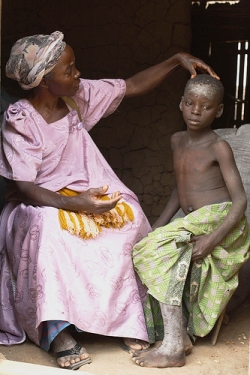On Wednesday, December 1 older people across Africa will mark this year’s World AIDS Day with a call for greater respect of their human rights.
This year’s World AIDS Day theme is Universal Access and Human Rights.
This is a key topic for older people who often miss out on vital information, testing and treatment because national HIV and AIDS campaigns simply don’t target them.
It is a mystery why older people are left out of the response when millions of them are affected by HIV and AIDS, either directly or indirectly.

Approximately 1.6 million older people are caring for the estimated 12 million children who have lost one or both parents to HIV or AIDS in sub-Saharan Africa (UNAIDS/WHO 2008).
In the Global Report on HIV and AIDS 2010 released by UNAIDS on November 23, the number of new HIV infections has been reported to be one-fifth lower than it was a decade ago.
Use World AIDS Day to highlight older people’s needs
While this is good news, our Advocacy and Communications Manager here in Kenya, Dr. Douglas Lackey, said we should use this World AIDS Day to call for more action to be taken on recognising the impact of HIV and AIDS and targeting people aged 50+.
He says: “Despite the target of universal access, the response to HIV and AIDS around the world rarely includes older people.
“Few prevention programmes in Africa target older people, yet in Kenya the HIV prevalence rate for the 50-64 age groups is 5% compared to the national rate of 7.1 percent (KAIS 2007).
“We are adamant proper prevention, care, support and treatment initiatives need to be implemented to target older people.
“Older people remain the poorest and most vulnerable members of society. Measures to mitigate the impact of HIV and AIDS on them have to be taken.”
One of the ways, we can help to alleviate the impact of HIV and AIDS on older people is by empowering them, economically.
Older people make huge contributions to HIV-affected households
HelpAge’s Africa Regional Representative, Nesta Hatendi, says: “Older people are not explicitly mentioned in any of the MDG targets or indicators.
“As a result, most development policies and programmes focus their efforts on measuring progress on child and maternal health, suggesting there is little understanding of the critical contributions of older people, especially in multigenerational households.
“But the social and economic contribution older women and men make to their families and society is invaluable.
“Many poor older people continue to work well past their retirement ages to support themselves and their families. In some parts of sub-Saharan Africa, 80% of men and 70% of women over 60 years work for a living.”
To mitigate the impact HIV and AIDS has on older people, governments around the world must recognise the importance of social protection, including social transfers which can reduce poverty and inequality – key drivers of the HIV and AIDS epidemic.
While great strides have been made, this World AIDS Day, we must remember that sub-Saharan Africa continues to have the highest number of people living with HIV in the world, totalling 22.5 million out of the 33.3 million globally.
Among them are millions of older people who must not be ignored and denied their rights to HIV and AIDS education and services.
